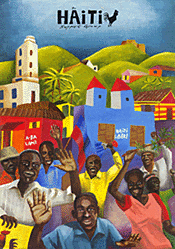In common with many others concerned with the elections to be held in Haiti
on Tuesday, 7th February 2006, the British solidarity organisation, the Haiti
Support Group hopes that fears of election-day violence will prove to be
unfounded.

We note the words of Helen Spraos, Christian Aid’s country representative,
who said: « All it will take is for a few people to start shooting into the air
in certain places, and people will not risk coming out to vote. »
Yolette Etienne, Oxfam’s Country Programme Manager for Haiti, shares these
fears, « Many residents of Port-au-Prince have told us they are too scared to
make the journey to vote on Tuesday. Innocent people in Haiti have endured a wave
of violence in the last two years. Rape is common in Port-au-Prince and this
is directly linked to the proliferation of arms. »
Etienne’s comment about the proliferation of small arms and the link to
sexual violence and other types of violence in Port-au-Prince highlights one of the
very great failures of the so-called ‘transition’ in Haiti, and that is the
miserable failure of the interim government and the UN peacekeeping mission
(the MINUSTAH) to implement a disarmament programme.
The Haiti Support Group was staggered to read a recent report revealing that,
while similar UN-run disarmament and demobilisation programmes have helped
disband guerrilla and other armed factions in Sierra Leone, Mozambique and El
Salvador, the UN programme in Haiti has so far has managed to collect just 30
weapons! The MINUSTAH force currently composed of some 7,000 troops and nearly
2,000 police has been in Haiti since June 2004.
Once the elections are over and international attention rapidly fades, the
issues of the widespread availability of small arms and armed violence will
remain.
While realising that what happens in the capital, Port-au-Prince, has a big
impact on attitudes outside the city, the Haiti Support Group is keen to stress
that the rest of the country, where three-quarters of the population lives,
is relatively calm and free of violence. Cite Soleil is not Port-au-Prince, and
Port-au-Prince is not Haiti.
We should also add that elections are not the be-all and end-all of
democracy.
Hervens Jeanty, the coordinator of KORAL, a small projects fund, supported by
Christian Aid, commented, « The candidates are more interested in sloganeering
than attacking the real social problems. Nonetheless, most Haitians are fed
up with suffering from disunity, poverty and insecurity. That’s why many people
think that the elections are a necessary step towards building a nation and
fighting against poverty. »
Haitian organisations involved in the long-term and very necessary work of
re-buliding a vibrant civil society movement for fundamental change in the
country are wary about the expectations raised by the elections.
Batay Ouvriye, the popular organisation working with newly-organised unions,
is clear that, as far as it is concerned, « these elections are a way for the
ruling class to rearrange their affairs on the backs of the poor majority. » The
organisation is calling for activists and militants to try and preserve their
independence from the political parties because, while controlled by the
ruling class and the imperialist powers, « the elections will not provide any
solution to the profound crisis afflicting the working people of Haiti. »
Joseph Georges, the coordinator of SAKS, a non-governmental organisation
working in support of the community radio network, expressed similar scepticism
about the elections, questioning their value in a society where impunity for
crimes remains unchallenged.
In an article entitled, « Elections with impunity: what can change? ». Georges
wrote, « We see the elections taking place in the country with many
presidential candidates who are people with serious records, people accused of
involvement in crimes, in corruption and in drug-trafficking, etc…The state accepts
these people as candidates. Society accepts them as candidates. What examples
are we giving our children and youth to look up to? »
Charles Arthur
Haiti Support Group